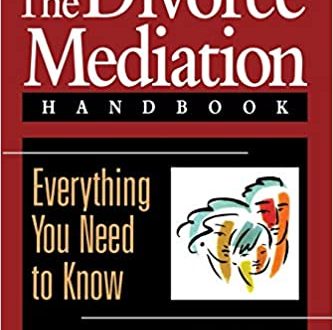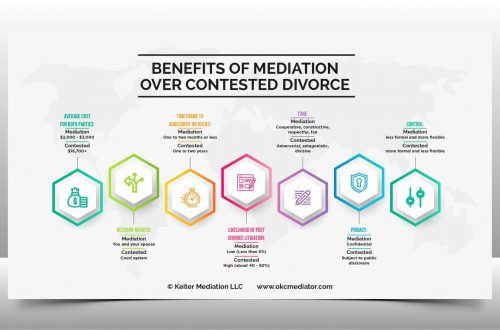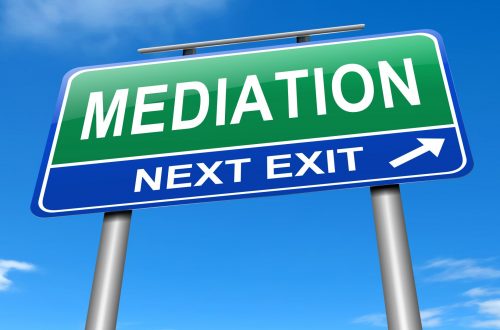Divorce Mediation

Divorce Mediation
Divorce mediation is a negotiation process in which an independent, impartial, and third party is employed to assist in resolving conflicts and negotiate a solution with the opposing parties. Both parties may engage in lawyers during the negotiation process (but that is not mandatory), but the mediator is the final arbitrator of any disputes regarding the settlement reached.
In divorce mediation, the two parties or individuals involved in the dispute have an open, honest and frank discussion about their respective positions, and work towards an agreement on how to proceed. In most instances, mediation is successful, with both parties agreeing on a payment plan, custody arrangements, property settlements and other matters. When a disagreement cannot be resolved through negotiation, a court order is necessary to enforce the terms of the agreement and award a final decree.
Divorce mediation can be done individually, by a professional mediator, or by a neutral third party such as an attorney. The mediator will interview each party and review all of the pertinent documents. They will also conduct interviews and gather information regarding the financial status of each party. After the interviewing process, they will present the information to both parties. The mediator will then try to establish a meeting between the two parties.
Divorce mediation is an extremely effective way to resolve disagreements regarding children, alimony, property settlements, and the division of assets. It is an excellent alternative to going to trial and allowing the opposing attorneys to take control of the proceedings.
Divorce mediation is typically less costly than going to court and allowing the opposing attorneys to “make the decision” on the outcome of the case. Mediation tends to be very quick and amicable, so the couple may not be able to meet the requirements for a divorce without the help of a mediator.
In most cases, there are several sessions for each spouse to meet with a separate mediator. This allows both parties to speak with the mediator freely, without judgment being made about the outcome of the case. In some cases, if one spouse is not satisfied with the outcome of a session, then they are encouraged to continue the process with a different mediator. In these cases, the parties may not speak with the mediators at all but instead meet with the mediators only when required.
Divorce mediation is a convenient alternative to going to court for couples who are unhappy with the outcome of their divorce proceedings. It is also a good option for those couples who do not wish to hire an attorney, because the mediators are not in the position of representing either party. and are not obligated to defend or argue in court on behalf of either party. In addition, both parties retain the right to speak to the mediator without fear of embarrassment or retribution. Most mediators have no special credentials and have no legal authority to act on behalf of either party.
Divorce mediation is a flexible option for people who want to save money. It is also helpful for those who do not have the time or resources to go to court or those who do not wish to spend money to fight in court over issues in their own marriage.
Divorce mediation usually takes place during a two-week meeting in a neutral location, where both spouses can meet freely, without judgment being passed by either party. It is important that the neutral place is comfortable and inviting, because in divorce cases the neutral space may be used to discuss matters about which one spouse wants out of the marriage, while the other wants the marriage to continue.
Divorce mediation usually starts out with a brief description of what each party wants out of the marriage. The mediator will ask questions about how the marriage came to be the way it is, and how each spouse feels about the past and current status of the relationship. He or she will ask the spouses to express themselves as openly as possible in order to help their partner feel comfortable, even if there are conflicts with the answers they provide. that will be shared during the course of the meeting.
Common areas that the meeting will cover are child custody, property, spousal support, alimony, and any other issues that are relevant to the particular case. The mediator may make suggestions about how to resolve the issue, if possible, but the primary goal of the meeting is to talk through the issues with the partners. When both spouses agree to the outcome of the meeting, the mediator will move forward with the negotiations. In some cases, the mediator may suggest that both parties work out a written agreement. These are called “restoration agreements.”




